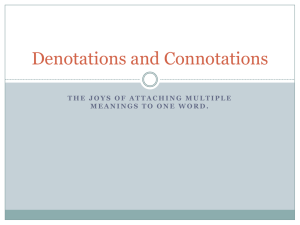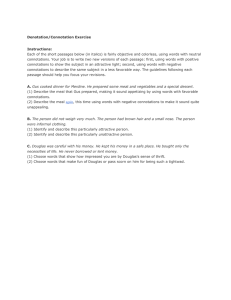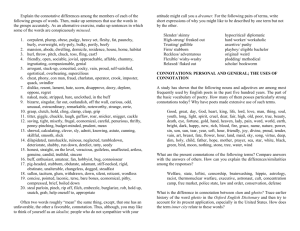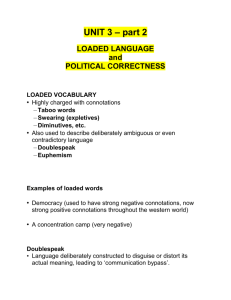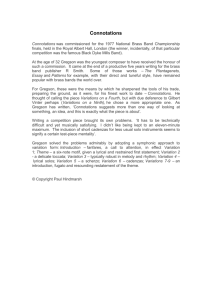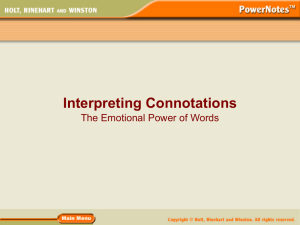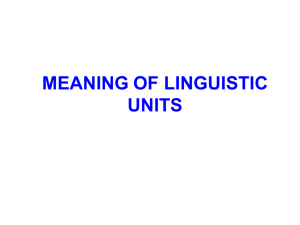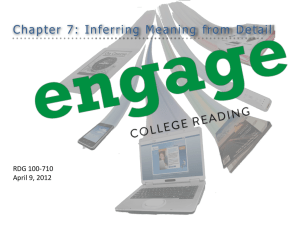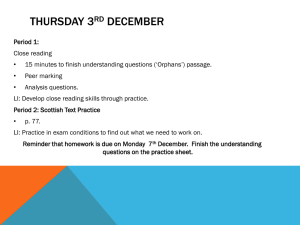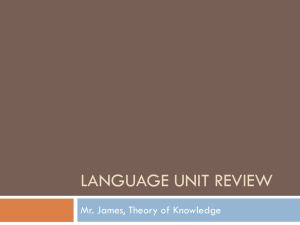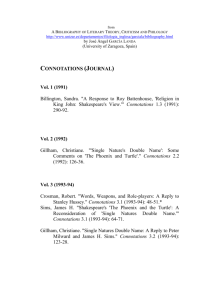Language as a Way of Knowing
advertisement
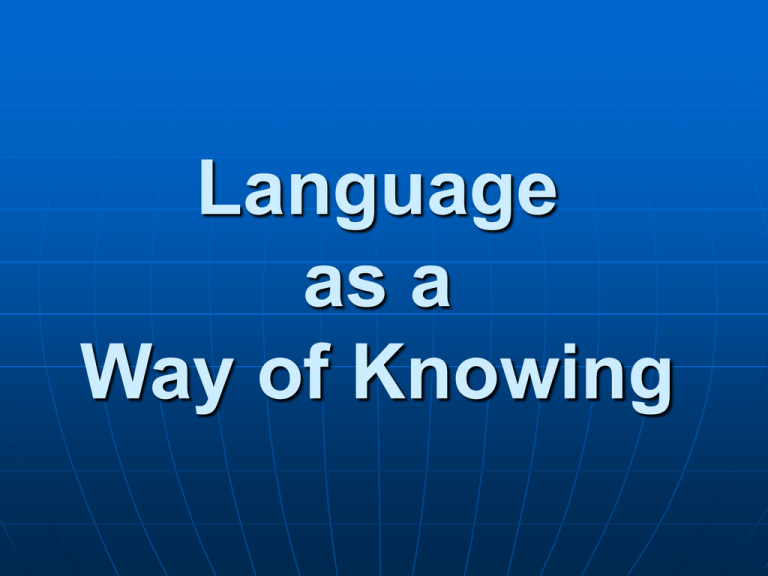
Language as a Way of Knowing Denotations and Connotations Denotation: The most literal and limited meaning of a word, regardless of what one may feel about it or the suggestions and ideas it implies. Connotation: The suggestion or implication evoked by a word or phrase over and above what they actually mean or denote. A connotation may be personal and individual, or general and universal. Names and connotations Shakespeare wrote, “What’s in a name? That which we call a rose by any other name would smell as sweet.” Would it have made a difference to the story had Romeo fallen in love with “Harriet” or “Susan,” not “Juliet”? Does your name (first name, last name) mean anything? If it doesn’t, is it easy to imagine exchanging it for any other name? In your society, are there more common and less common last names? Do certain names have certain socio-economic, political, religious, ethnic, or other connotations? When you hear names like “Smith,” “Goldstein,” or “Gomez” do particular associations come to mind? Where do these come from? Are these assumptions or connotations true in the same way that saying triangles have three sides is true? What would your view be of someone what you have casually spoken to whose business card you happened to find on the floor and whose name is accompanied by: MD, D.Phil, CEO, Mrs., III, Junior? How might your preconceptions about names influence your perception of the people you meet? How might others’ preconceptions of your name (or nationality, religion, skin color, etc.) affect how they perceive you? “What’s in a Name?” by Gloria Naylor Language and Knowledge Issues In trying to determine whether we are being given a factual report, think about the following knowledge issues when using language as way of knowing: Selection Out of all possible events or details that could have been reported, what has been chosen? Is it possible to compare the description with another by someone else? Recognize that the purpose of the report and its intended audience affect what details are included. Emphasis Out of all the events and or details reported, what has been stressed as most important, and, again, what do the guiding values or criteria seem to be for this emphasis? How has the emphasis been achieved: through placement of ideas in the main clause rather than the subordinate clause of the sentence? through placement in emphasized position, such as the final words of a sentence or paragraph? through more detailed treatment of some details rather than others? Language and Knowledge Issues Word Choice What kind of language has been used, and does it seem to be appropriate to the apparent purpose of the description? Is it denotative, factual language, or is it connotative and suggestive? What emotions are expressed? What values, positive or negative, are expressed or suggested? Is there evidence of bias? Is a person described as “courageous” or “reckless,” as “relaxed” or “lazy,” as “curious” or “nosy,” as “assertive” or “pushy”? The choice of words in the description may tell you more about the writer’s values than about the person being described. Context In what context has the description been placed, and how might this framing affect the overall meaning of the passage? What does its purpose seem to be? Problematic Meaning/Knowledge Issues in Language Vagueness Many words are intrinsically vague, and their meaning depends on context. Activity Without thinking too much about it, write a figure down for each of the following: 1. John lives close to his school. How near does he live? 2. Mr. Smith is middle-aged. How old is he? Discuss Do you think communication would be improved if we got rid of vague words, or do you think they sometimes serve a Useful purpose? Problematic Meaning/Knowledge Issues in Language Ambiguity Many words and phrases are ambiguous. “The duchess cannot bear children” can mean either that the she is unable to have children, or that she cannot stand them. Activity Each of the following sentences is ambiguous. Give two different meanings for each. 1. They saw Mrs. Jones and the dog sitting under the table. 2. Visiting relatives can be boring. Discuss To what extent can punctuation help to reduce the ambiguity of a sentence? Problematic Meaning/Knowledge Issues in Language Secondary Meaning Denotations, connotations, and use of euphemisms are all important. Activity Explain the different connotations of each of the following sets of words: • slender, skinny, thin • stench, smell, fragrance Discuss List some euphemisms for “ugly” or “stupid.” Why are these more “acceptable” terms? Problematic Meaning/Knowledge Issues in Language Metaphor We also give language implied meanings. Discuss Explain the differences between the two following sentences: • “My brother is a butcher.” And “My dentist is a butcher.” Irony Irony means that we cannot necessarily take a statement at face value, and it adds another layer of ambiguity to language. Misplaced Modifiers Fine food expertly served by waitresses in appetizing forms. For sale: an antique desk suitable for lady with thick legs and large drawers. Wanted. Man to take care of cow that does not smoke or drink. Have several very old dresses from grandmother in beautiful condition. Mixing bowl set designed to please a cook with round bottom for efficient beating. Remember in prayer the many who are sick of our church and community. Missing or Mutilated Modifiers The following are examples of missing or mutilated modifiers, again all from real life signs, ads or notices: Dinner Special -- Turkey $2.35; Chicken or Beef $2.25; Children $2.00. Now is your chance to have your ears pierced and get an extra pair to take home, too. For those of you who have children and don't know it, we have a nursery downstairs. Don't let worry kill you -- let the church help. The hotel has bowling alleys, tennis courts, comfortable beds, and other athletic facilities. Language Questions What is the role of language in knowing? How does it influence what we know and how we know it? How could you know about the world if you had no language or means of communicating with other people? How easy is it to misunderstand the body language of someone from a different culture? What words have entered the English language due to technology? How does technology affect language as a “way of knowing”? Do animals have language? How do we KNOW? How would you try to explain to a blind person what the word “red” means? What does this suggest to you about the limitation of definitions? Language Questions To what extent is your use of language accompanied by images? Does every word conjure up an image or only some of them? Do you think communication would improve if we got rid of vague words or do they sometimes serve a useful purpose? What do you think Charles Sanders Peirce meant when he stated, “It is easy to be certain—one only has to be sufficiently vague.”? How does one translate idioms into another language? Try these: “David is barking up the wrong tree.” “Samuel was only pulling your leg.” If you are fluent in more than one language, to what extent do you think differently when you switch between languages? Does the way you describe something affect how you feel about it? Should offensive language be censored? Does math have its own “language”?
